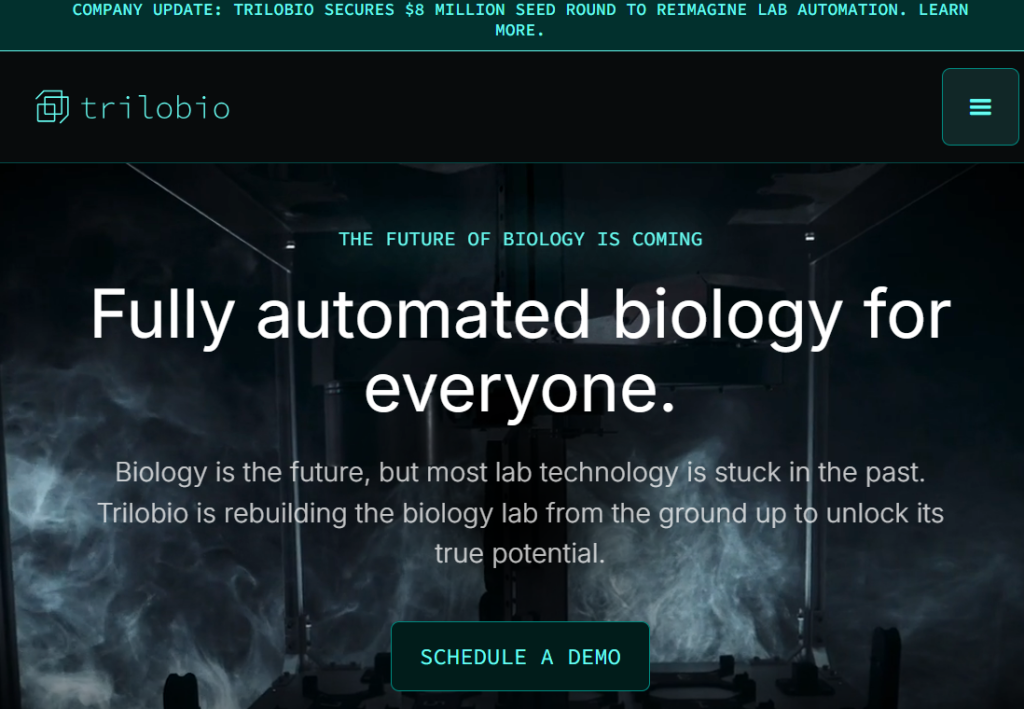Trilobio Raises $8M Seed Round to Reinvent Synthetic Biology Automation
July 28, 2025
byFenoms Start-Ups

Trilobio, a synthetic biology startup, has secured $8 million in seed funding in a round led by Initialized Capital, with participation from Argon Ventures and Lowercarbon Capital. Spearheaded by Roya Amini-Naieni, the company is building intelligent automation infrastructure that promises to radically transform how biological experiments are conducted and scaled.
With this fresh round, Trilobio is entering a sector that's ripe for disruption - where biotech labs still operate like manual assembly lines while demand for bio-based products and therapies surges worldwide.
What Trilobio is Building
Trilobio is developing what can best be described as the “robotic operating system” for biology labs. Their platform combines hardware precision, AI-driven lab protocol optimization, and automated decision-making loops to bring efficiency, reproducibility, and intelligence into synthetic biology workflows.
Unlike traditional lab automation tools that focus on step execution (pipetting, incubating, mixing), Trilobio takes a systems-level approach. It analyzes experimental data in real-time, adjusts protocols on the fly, and learns over time - enabling the kind of iterative improvement typically reserved for software development environments.
The platform is designed to:
- Reduce human error in bench work
- Accelerate hypothesis-to-discovery cycles
- Integrate with LIMS and ELN systems
- Enable biofoundries to scale faster with fewer scientists
- Lower the cost per experiment via optimization and reusability
This convergence of AI, robotics, and synthetic biology is ushering in a new breed of lab - one that’s self-improving, scalable, and driven by code as much as chemistry.
The True Differentiator: Intelligence, Not Just Automation
While lab automation is not new, Trilobio’s edge lies in its intelligent orchestration. Most existing tools rely on rigid protocol steps, but Trilobio’s system dynamically adapts based on real-time variables - such as reagent concentration, temperature fluctuations, or anomalies in output.
This adaptive layer is where synthetic biology hits its current bottleneck: labs are still operating like 1990s software teams - slow release cycles, heavy manual QA, and little feedback loops. Trilobio is doing to biotech what DevOps did to software.
For Founders: The Insight Hidden in Automation Infrastructure
Here’s something often missed by early-stage deep tech founders building infrastructure products: Your users aren’t just buying features - they’re betting on you to shrink complexity.
Trilobio isn’t just automating - they’re offering predictability in an industry where unpredictability costs millions. And that’s a core lesson for builders: The most valuable B2B startups don’t sell software, they sell certainty.
If you’re creating tools in frontier tech, ask yourself:
- Can your product reduce decision fatigue for the customer?
- Are you making experimentation faster or merely more automated?
- Can your system learn from usage data and compound value over time?
Founders who answer these with intent are far more likely to gain product-market traction in complex industries. Automation is just the first step. Cognitive leverage is the real moat.
The Synthetic Biology Market Is Heating Up
The synthetic biology market is growing at an unprecedented rate. According to Grand View Research, the global market was valued at $13.1 billion in 2023, and is projected to expand at a 26.5% CAGR, reaching $55.3 billion by 2030.
What’s fueling this? Three key drivers:
- Demand for Sustainable Biomanufacturing: From biofuels to bioplastics, industries are turning to engineered biology for scalable, eco-friendly production.
- Precision Medicine & Cell Therapy: Biotech firms need faster iteration on genetic circuits and protein engineering - something traditional labs can’t deliver at scale.
- Global Supply Chain Reconfigurations: Decentralizing biotech manufacturing and enabling cloud-lab models are increasingly critical post-COVID.
Yet, despite this growth, a staggering 70% of biology labs still rely on semi-manual workflows, per a 2024 report by Biocompare. That’s a wide-open field for platforms like Trilobio to define the infrastructure layer of the next-gen bioeconomy.
Investor Perspective: Why This Round Matters
Investors are pouring capital into deep tech with tangible industrial applications. Initialized Capital, known for backing early-stage technical founders, clearly sees in Trilobio not just a product, but a platform for programmable biology.
With Lowercarbon Capital’s focus on planetary solutions and Argon Ventures’ operational expertise, this investor lineup suggests Trilobio will likely expand into green chemistry, pharma R&D, and distributed biomanufacturing hubs - all of which need robust, intelligent automation.
The $8M raise gives the company the runway to refine its platform, expand pilot programs with major research institutions, and build out a go-to-market team focused on biofoundries, pharma labs, and synthetic biology startups.
Looking Ahead: Trilobio’s Role in the Bio-OS Race
The race to build the “AWS of synthetic biology” is real. Companies that can abstract biological complexity, standardize execution, and democratize access will lead the future of biotech.
Trilobio is positioning itself not just as a hardware player or lab toolmaker, but as a foundational layer for programmable bio-manufacturing. Their long-term vision - hinted at by insiders - includes developing API-accessible bio-automation tools, real-time collaboration dashboards, and perhaps even integration into cloud-lab networks like Strateos or Emerald Cloud Lab.
In a world where bio-engineering is becoming as modular as code, Trilobio could well become the Linux of lab automation - open, intelligent, and essential.









